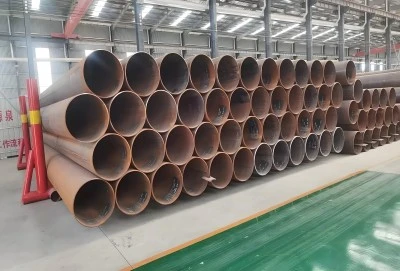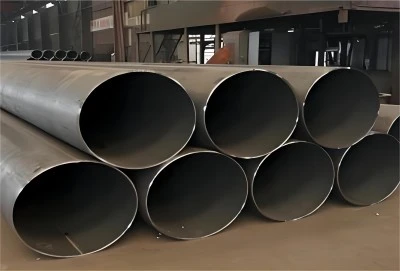API 5L X60 steel pipe is a crucial component in various industries, particularly in oil and gas transportation. Known for its high strength and durability, this pipeline material requires proper maintenance to ensure its longevity and optimal performance. In this comprehensive guide, we'll explore the best practices for maintaining API 5L X60 pipe, focusing on corrosion prevention, inspection schedules, and effective protective coatings.
|
|
|
What Are the Best Practices for Preventing Corrosion?
Corrosion is one of the primary concerns when it comes to maintaining API 5L X60 steel pipe. This electrochemical process can significantly reduce the lifespan of pipelines and compromise their structural integrity. Implementing effective corrosion prevention strategies is essential for ensuring the long-term reliability of your pipeline system.
One of the most effective methods for preventing corrosion is cathodic protection. This technique involves applying a small electrical current to the pipeline, which counteracts the electrochemical reactions that cause corrosion. There are two main types of cathodic protection systems:
- Impressed Current Cathodic Protection (ICCP): This system uses an external power source to apply a protective current to the pipeline.
- Sacrificial Anode Cathodic Protection: This method employs sacrificial anodes made of more reactive metals, such as magnesium or zinc, which corrode preferentially, protecting the steel pipe.
Another crucial aspect of corrosion prevention is proper pipeline coating. High-quality coatings act as a barrier between the steel surface and corrosive elements in the environment. We'll discuss coating options in more detail later in this article.
Regular monitoring of soil conditions and water quality in the pipeline's vicinity is also essential. Aggressive soil conditions or water with high chloride content can accelerate corrosion. By identifying these risk factors early, you can take appropriate measures to mitigate their effects.
Implementing a comprehensive corrosion management program that includes regular inspections, data analysis, and preventive maintenance can significantly extend the life of your API 5L X60 steel pipe.
How Often Should API 5L X60 Pipelines Be Inspected?
Regular inspections are crucial for maintaining the integrity of API 5L X60 steel pipe systems. The frequency of these inspections depends on various factors, including the pipeline's age, operating conditions, and environmental factors. However, there are some general guidelines that can help you establish an effective inspection schedule.
For new API 5L X60 pipelines, it's recommended to conduct a baseline inspection within the first year of operation. This initial assessment provides a reference point for future inspections and helps identify any early signs of potential issues.
After the baseline inspection, the frequency of subsequent inspections typically falls into the following categories:
- High-risk areas: Every 1-3 years
- Moderate-risk areas: Every 3-5 years
- Low-risk areas: Every 5-7 years
It's important to note that these are general guidelines, and your specific inspection schedule should be tailored to your pipeline's unique characteristics and operating conditions. Factors that may necessitate more frequent inspections include:
- Age of the pipeline
- History of leaks or failures
- Proximity to environmentally sensitive areas
- Exposure to harsh environmental conditions
- Changes in operating parameters
Various inspection techniques can be employed to assess the condition of API 5L X60 pipe, including:
- In-line inspections (ILI) or "smart pigging"
- External corrosion direct assessment (ECDA)
- Hydrostatic testing
- Ultrasonic testing
- Magnetic flux leakage (MFL) inspection
Each of these methods has its strengths and limitations, and a combination of techniques is often used to get a comprehensive picture of the pipeline's condition. Regular inspections, combined with proper data analysis and interpretation, are essential for maintaining the integrity of API 5L X60 pipe systems and preventing potential failures.
What Coatings Work Best for Protecting API 5L X60?
Selecting the right coating is crucial for protecting API 5L X60 pipe from corrosion and extending its service life. The ideal coating should provide a robust barrier against moisture and corrosive elements while maintaining its integrity under various operating conditions. Here are some of the most effective coating options:
- Fusion-Bonded Epoxy (FBE): This is one of the most widely used coatings for API 5L X60 steel pipe. FBE provides excellent corrosion protection and adheres well to the steel surface. It's applied as a dry powder and then heated to form a continuous, tightly bonded coating.
- Three-Layer Polyethylene (3LPE): This system consists of an epoxy primer, an adhesive layer, and an outer polyethylene layer. 3LPE coatings offer superior mechanical protection and are particularly suitable for pipelines that require additional protection against soil stress or abrasion.
- Three-Layer Polypropylene (3LPP): Similar to 3LPE, but with a polypropylene outer layer. 3LPP coatings are ideal for high-temperature applications and provide excellent resistance to impact and abrasion.
- Liquid Epoxy: This coating is often used for field joints and repairs. It can be applied in various thicknesses and cures to form a hard, protective layer.
- Polyurethane: These coatings offer excellent resistance to abrasion and impact, making them suitable for pipelines in harsh environments or those subject to frequent handling.
When selecting a coating for API 5L X60 pipe, consider factors such as:
- Operating temperature range
- Soil conditions
- Installation method (buried, above-ground, or subsea)
- Expected mechanical stresses
- Chemical exposure
It's also crucial to ensure proper surface preparation before applying any coating. This typically involves thorough cleaning and abrasive blasting to create an ideal surface profile for coating adhesion.
Regular inspection and maintenance of the coating system are essential. Even small defects in the coating can lead to localized corrosion, which can quickly compromise the integrity of the API 5L X60 steel pipe. Implementing a proactive coating maintenance program, including periodic assessments and timely repairs, can significantly extend the life of your pipeline system.
China API 5L X60 Steel Pipe Suppliers
Proper maintenance of API 5L X60 steel pipe is crucial for ensuring its long-term performance and reliability. By implementing effective corrosion prevention strategies, adhering to regular inspection schedules, and utilizing appropriate protective coatings, pipeline operators can significantly extend the service life of their API 5L X60 steel pipe systems. Remember, a proactive approach to maintenance not only enhances safety and reliability but also reduces long-term costs associated with pipeline failures and replacements.
LONGMA GROUP products cover levels including PSL1 and PSL2. Our Fastest Delivery Time is 7 Days for normal specifications. Our products undergo various tests: Chemical Component Analysis, Mechanical Properties (Tensile strength, Yield strength, Elongation), Ultrasonic Testing, NDT (nondestructive testing), Hydrostatic Test, X-ray Test. If you are choosing your China API 5L X60 steel pipe suppliers, welcome to contact LONGMA GROUP at info@longma-group.com.














